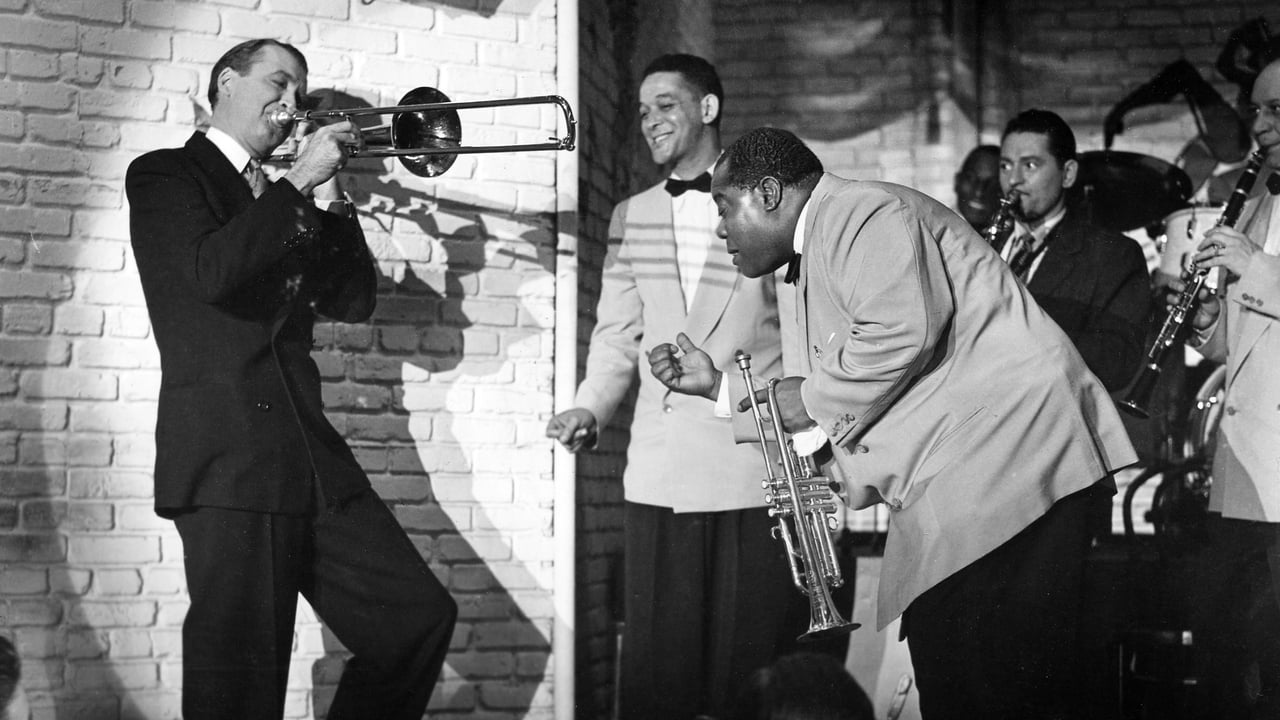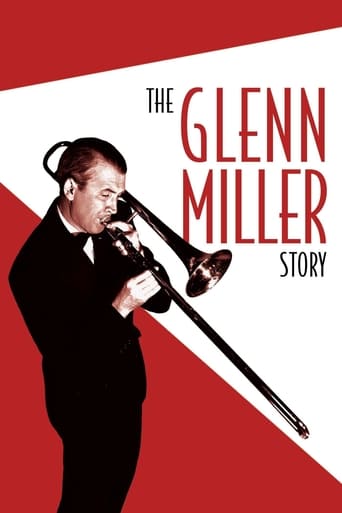Hellen
I like the storyline of this show,it attract me so much
NekoHomey
Purely Joyful Movie!
CommentsXp
Best movie ever!
Edwin
The storyline feels a little thin and moth-eaten in parts but this sequel is plenty of fun.
Kirpianuscus
music, Glenn Miller's music, , James Steward, June Allison , Henry Morgan, lovely clichés and touching homage to a great American musical legend. and the entire flavor of a period, fresh, clear, unique. a perfect film because nothing missing. all has the force to seduce each category of public. and James Steward... he is himself. in the perfect clothes of his role who becomes part of him. remembering all his performances . and giving something not exactly original but touching in real profound sense. a remarkable film because it preserves an entire universe. sure, the explanations are not insignificant but you feel, scene by scene, to be master of a great Christmas gift. because it is a fairy tale, it represents the spirit of the films from "50's but remains a special delight like a time travel.
ackstasis
The primary goal of a good biopic is to educate the audience about a man's life, and to perhaps offer a unique insight into the personal life, ambitions and motivations of a relatively well-known personality. 'The Glenn Miller Story (1953)' accomplishes only one of these objectives. The straightforward title of Anthony Mann's picture already offers a hint at the nature of the film itself, which is a rather pedestrian retelling of the life of jazz musician Glenn Miller. As far as biopics go, the film is undemanding and, in terms of storytelling, dwells well within the lines of conventionality, but the sheer charisma of James Stewart, in addition to an absolutely incredible jazz soundtrack, makes it a far better film than it has any right to be. Aside from his long-unexplained disappearance, which the film doesn't explore in any detail, the life of Glenn Miller is arguably no more exciting than any other successful musician, but perhaps director Anthony Mann simply made the decision to enable him to play "Moonlight Serenade" on no less than three occasions. However, it's such a perfect musical composition that I don't blame him.Talent is certainly an important ingredient for success, but even the most talented musicians must rely on dedication and sheer luck before they become famous. Glenn Miller (1904-1944) spent the first few years of his musical career in virtual anonymity, the public seemingly finding nothing in his work to distinguish him from the thousands of other aspiring musicians. However, after charmingly tempting his ex-college sweetheart (June Allyson) into a New York marriage, and spending years chasing a seemingly unreachable dream, Miller finally struck fame and success, his musical arrangements and Miller band performances making him a very rich and popular man, indeed. In 1942, at the peak of his career, Miller voluntarily joined the Armed Forces to, in his own words, "put a little more spring into the feet of our marching men and a little more joy into their hearts." One of the film's most heartwarming sequences concerns Miller's attempts to modernise the traditional military marching song, with his "St. Louis Blues March" tossing some blues and jazz into the mix. The resulting broad smiles of the parading soldiers alone make the film worth watching.Jimmy Stewart, as always, brings his characteristic charm and cheerfulness to the role. In real life, Miller was said to possess a stern and think-skinned personality that sometimes alienated his musicians, but the picture doesn't even attempt to explore this issue, and, with Stewart in the leading role, it couldn't possibly have worked, anyway. The chemistry between Stewart and June Allyson differs little from what we've seen before, but it does succeed in being genuinely touching at times. Of course, the real star of the film is the music, and the audience is treated to a well-selected succession of memorable jazz tracks, most notably "Moonlight Serenade," which I find to be a perfect piece of music. Other songs include "Little Brown Jug," "We Must Be Vigilant," "In the Mood," "Pennsylvania 6-5000" and even Louis Armstrong turns up to perform "Basin Street Blues."
writers_reign
This hews pretty strictly to the standard biopic formula when the subject is a performer and/or composer, lyricist; the formula is in three-parts comprising Early Struggles, Breakthrough, with the last third a celebration of the subject's Greatest Hits. The majority of biopics also reserve the right to 'tamper' with facts and chronology and this is no exception; long before the band is established - i.e. 1937/38, it finally 'made it' in 1939 - they are heard running down Over The Rainbow which was, of course, written in 1939 for The Wizard Of Oz and similarly they are heard playing - in 1939 - I Know Why, which was written, by Harry Warren, for their first film, Sun Valley Serenade, in 1941. There are other examples; the film clearly implies that Miller was a native of Colorado when in fact he was born in Iowa, moved as a child to Nebraska, and didn't reach Colorado until his teens, also he never saw his second adoptive child, a daughter, yet she is featured in a central scene when Helen brings her from the orphanage on their tenth anniversary.This leaves us with arguably the main event: the music and here it is not so easy to quibble; anyone who likes Miller's records will like the film; it's as easy as that. Jimmy Stewart was a stranger to bad performances and even June Allyson's saccharine quality is not too hard to take in this context. Even non-Miller buffs will probably enjoy it as a sentimental heart-warmer.
ianlouisiana
Major Miller spent a lot of his war here in the U.K. with the USAAF and frequently broadcast on the BBC ,sometimes using British service musicians. One such,the late Kenny Baker - a fine trumpeter - uncharacteristically starstuck,declared his admiration for the trombonist who looked at him for a minute then said,"Your hat's not on straight". Hard to imagine Mr J.Stewart's genial "aw shucks" bandleader being so hardass,but I guess nice guys finish last in showbiz just like everywhere else. "The Glenn Miller Story" first came to my attention in the mid 1950s when I bought a Louis Armstrong LP which contained a long version of "Basin Street Blues" which,according to the cover,was from the soundtrack of the film.Indeed the song was played by Louis and the All Stars in a nightclub scene where Miller sits in on the trombone,but although the format is similar,it is not the version on the album. I don't think Miller ever seriously considered himself a jazz musician certainly his big bands weren't jazz bands like those of his contemporaries Duke Ellington and Count Basie,but,on a good day with the the wind behind them they chugged along quite happily and fitted in well with the predominately white middle - class culture that haunted the movie - houses and ballrooms in the late 30s and early 40s. Old - timers like myself,hanging grimly on to life,only have to pick up a scratchy 78 of "String of pearls" as as we seek to broaden our wardrobe in some charity shop to be transported back to a world of Ration Books and Anderson shelters. And there's the rub.Miller's music hasn't been "relevant" for half a century - the film was released during the birth of the rock 'n' roll age - and is unlikely to appeal to the i - pod generation,so the future audience for "The Glenn Miller Story" is uncertain. Apart from Mr J.Stewart's performance and the reproduction of the sound of the Miller band,the film is pretty dire stuff.Miss J.Allyson is too sweet and All - American to be true,the clichés come thick and fast and ,as everybody know what is going to happen in the end,it's pretty hard to maintain any tension. Mr H.Morgan has the best of the feature roles - here is a man who never gave less than a fine performance.He gives a lesson in how to quietly steal a film. Buddy Rich - in his youth a drummer with Miller's great rival Tommy Dorsey - spoke for many musicians when he said "Glenn Miller should have lived - his music should have died".

